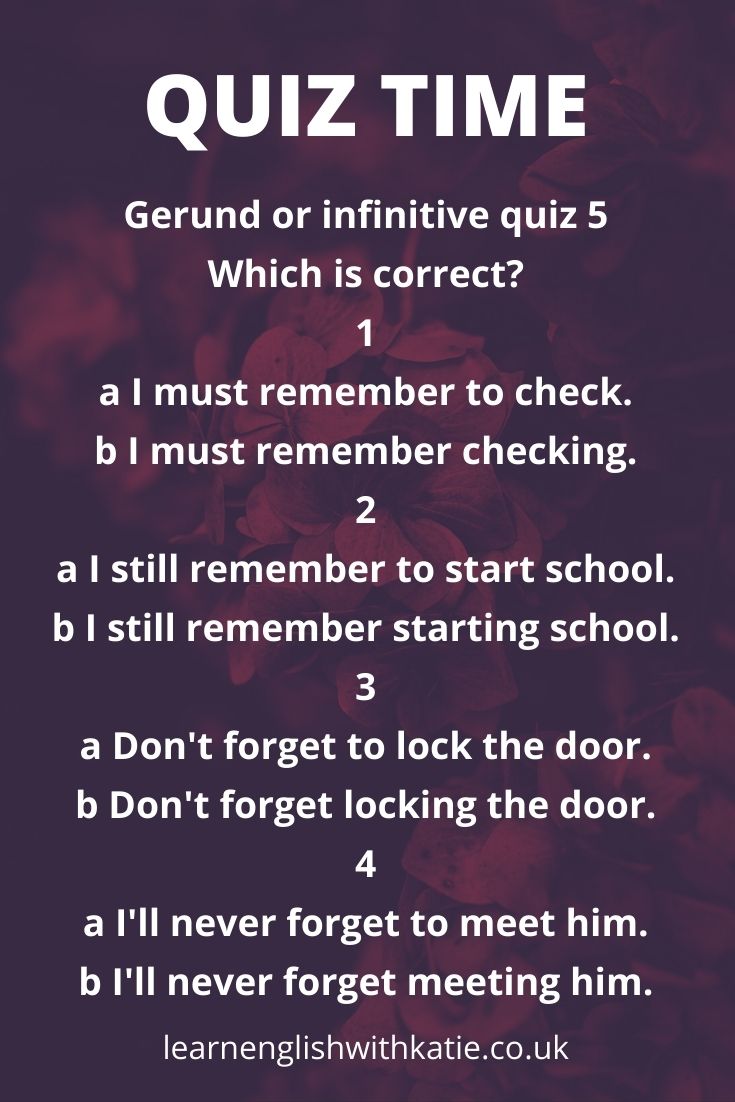|
Quiz time! Which sentence is correct in each pair? 1a I must remember to check. 1b I must remember checking. 2a I still remember to start school. 2b I still remember starting school. 3a Don't forget to lock the door. 3b Don't forget locking the door. 4a I'll never forget to meet him. 4b I'll never forget meeting him. Keep reading to check your answers. There are some verbs which can be followed by either the gerund or the infinitive but the meaning is different. Quiz answers: 1 a 2 b 3 a 4 b Let me explain by giving you some examples. Remember + infinitive This means that you remember to do something and then you do it. Remembering comes before the action. For example: I must remember to do my homework tonight! Did you remember to lock the door? Remember + gerund This means that you do something and then later remember it. Remembering comes after the action. For example: I will always remember swimming in the sea for the first time. I still remember buying my first car. Forget + infinitive Forget works in the same way as remember. It looks forwards in time. For example: Don’t forget to turn off the lights. Forget + gerund This looks backwards in time. For example: I’ll never forget teaching my daughter to drive. She was so bad at it! Try + infinitive We usually use the infinitive when we are talking about making an effort to do something difficult. For example: I’m trying to get a new job. He tried to learn French but he found it too difficult. In the past tense, this grammar usually means somebody tried but wasn’t successful. (He tried learning French is also possible but less usual.) We can also use this to say what our aim is. For example: I’m trying to lose weight. Try + gerund We use the gerund when we are talking about testing something or experimenting to see what will happen or see if we like it. For example: I’d like to try cooking Indian food. Try turning the computer off and on again. That might fix the problem. We can also use this to say the steps we are taking to reach our aim. For example: In order to lose weight, I’m trying exercising more often, eating less bread and drinking more water. Stop + infinitive We use the infinitive to say that we stop one thing in order to do another thing. For example: He stopped to look at the map. The teacher stopped to see if anyone had any questions. This is sometimes called the infinitive of purpose and you can read more about using the infinitive in this way in part 3. Stop + gerund We use the gerund to describe the activity which stops. For example: She stopped running because she needed a rest. We can use these two together like this: She stopped running to have a rest. This is the last post in a series of 5. If you missed the start of this series, you can find part 1 here. I have also written an e-book which covers this topic in more detail and contains practice exercises. Or get my free verb list by clicking this button.
0 Comments
Your comment will be posted after it is approved.
Leave a Reply. |
About the blogFollow the blog for mini lessons and tips on how to improve your English. Categories
All
Archives
July 2024
|

 RSS Feed
RSS Feed
